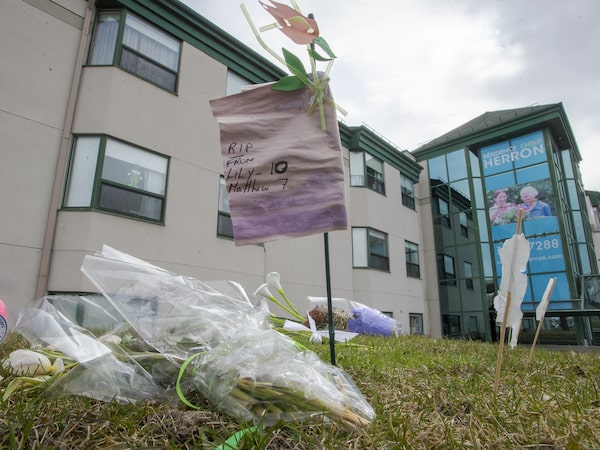
Flowers and notes for loved ones are seen at a makeshift memorial in front of the CHSLD Herron seniors residence on April 22, 2020, in Dorval, Que. Coroner Géhane Kamel is hearing testimonies this month into events that led to 47 deaths in the spring of 2020 at Résidence Herron.Ryan Remiorz/The Canadian Press
A resident at the Herron nursing home who developed breathing problems because of COVID-19 was left on his own for three days until he was able to get an ambulance to take him to hospital, a Montreal nurse recalled Friday at a coroner’s inquest.
Sobbing at times, the nurse described a visit she made to Herron the following week, where elderly residents, some who hadn’t been bathed for months, told her they expected to die soon, away from their loved ones.
Marie-Ève Rompré, a nursing supervisor at St. Mary’s Hospital, was a witness appearing before coroner Géhane Kamel, who is hearing testimonies this month into events that led to 47 deaths in the spring of 2020 at Résidence Herron, a long-term care home in Montreal’s West Island.
The inquest heard previously that most of Herron’s employees went missing after a first resident with COVID-19 died on March 27. Two days later, another Herron resident was admitted to St. Mary’s, showing COVID-19 symptoms, Ms. Rompré said. He eventually tested positive.
The man told St. Mary’s staff that a resident in a nearby room had died of the new illness. He said he had trouble breathing for three days, but no one had answered the call bell, so he phoned the ambulance service himself.
Later that day, three administrators from the local health authority, CIUSSS ODIM, went to Herron and discovered only three employees remained to look after 139 unfed, dehydrated people.
Ms. Rompré led a team of health care workers from St. Mary’s who joined other outside employees sent to Herron to fill in for the missing personnel. She first went to the residence the evening of April 8, before the rest of the team arrived on April 9.
She said the facility was still disorganized and residents remained in dismal conditions.
She checked on a female resident with a swollen leg and a wound on the coccyx. The woman said she was in constant discomfort, but her drug chart indicated she hadn’t been given pain-relief medication in more than a month.
A bandage covered the woman’s wound, but it hadn’t been changed for so long that the skin had grown back over it. Ms. Rompré suggested she could find a specialist to look at the wound. The woman replied that she had resigned herself to the bandage never coming off. “I’ll die with it,” she said.
Ms. Rompré also went into a room where a half-conscious resident, Thérèse Maltais, was moaning. Then the bedside phone rang. It was Ms. Maltais’ husband, who started crying because it was the first time anyone had answered in weeks.
Ms. Rompré propped Ms. Maltais up and held the phone receiver. The couple cried as they spoke with each other again.
Ms. Maltais later told Ms. Rompré, “I don’t think I’ll make it. It’s not going well.” She was hospitalized but was among the 47 who died.
CIUSSS employees aren’t allowed to speak to the media without authorization. Ms. Rompré said she reported what she saw to other health officials, but added, “I would have never gone to the media. I wanted to keep my job.”
The troubles at Herron were eventually made public by the Montreal Gazette on April 10.
The health authority had told Herron owner Samantha Chowieri on March 30 that it was taking charge of her facility. However, CIUSSS didn’t take full control until April 10, and both sides have accused each other of prolonging the crisis.
The head of a personnel agency who supplied staffers to Herron testified Friday that a CIUSSS administrator gave her an ultimatum: to transfer her workers to the health authority or be pushed aside. “We wanted to help ... it was bizarre,” said the agency head, whose name is under a publication ban.
Documents filed at the inquest show that officials thought hiring Herron personnel into the CIUSSS would stabilize the staffing.
The lingering chaos led Ms. Kamel to express outrage that residents were still in a state of neglect after CIUSSS said it had taken charge.
In a report filed in exhibit, Marilyn Leduc, a nurse who visited Herron on April 4, described seeing a resident in a common room with no pants, an overflowing diaper dangling down to his knees. “The poor man has dried feces on his thighs,” she wrote.
“Technically you’ve been in control of the facility since March 30. How could this man be in this situation on April 4?” Ms. Kamel asked. “It’s not even basic hygiene.”
Our Morning Update and Evening Update newsletters are written by Globe editors, giving you a concise summary of the day’s most important headlines. Sign up today.